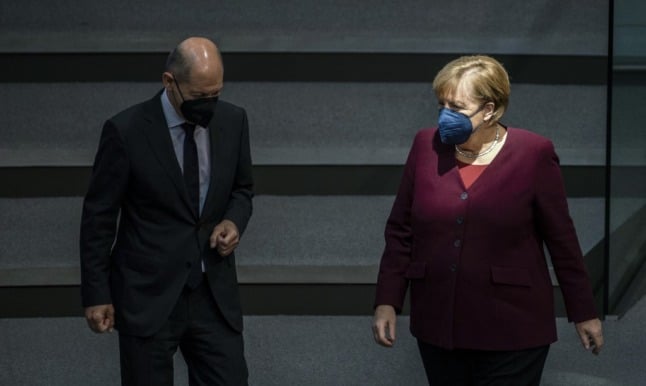The EU’s most populous country officially recorded 50,196 new cases over 24 hours to Thursday — the first time the figure has exceeded 50,000.
On Saturday, the Robert Koch Institut (RKI) health agency reported 45,081 more cases with 228 deaths over the previous 24 hours.
READ ALSO: Skip big parties, urges German health agency amid Covid surge
“I am very concerned by the situation,” Merkel said in a weekly podcast.
“We face difficult weeks. We need a national effort… to break the difficult autumn and winter wave of the pandemic.
“If we show solidarity, if we think about protecting ourselves and taking care of others, we can spare our country a great deal this winter,” she said.

The above chart from Our World in Data shows the proportion of people who are fully vaccinated in all of the countries covered by The Local. Germany, and the other German-speaking countries Austria and Switzerland, are at the bottom of the pack.
Infections and deaths have been climbing steeply since mid-October, in an outbreak blamed on Germany’s relatively low vaccination rate of just over 67 percent.
Merkel told those refusing jabs “to reflect” on their position and agree to be inoculated against Covid-19.
She also backed a third dose saying it was a “real chance to break this major wave”.
The country’s probable next leader Olaf Scholz this week demanded new restrictions to combat the record surge in infections.
READ ALSO: Could Germany really see a lockdown this winter?
READ ALSO: Why Germany’s Covid booster jab campaign has failed to take off
The measures proposed by the incoming coalition parties include restricting access to certain facilities to those who are vaccinated or have recovered from the disease.
They also want to tighten testing requirements at workplaces and reintroduce free rapid antigen tests, a measure that had been in place over the summer but was abandoned in mid-October.
The proposals will be scrutinised by the Bundestag lower house of parliament this week and are expected to come into force at the end of the month.
Merkel said it was “urgent” that the federal government and regions take a “unified approach” and agree a threshold for when new measures need to be imposed.
Hospitals in some regions are already overwhelmed, especially in the east, and have started transferring patients to less affected regions.
The below chart from the RKI Covid-19 dashboard shows the least and worst-affected parts of Germany, with purple representing the areas with the highest number of cases per 100,000 people over the last seven-day period, followed by pink, then the darkest red.

Several of the worst-hit states, including Saxony, Bavaria and Berlin, have introduced new restrictions on unvaccinated people at most indoor public venues.



 Please whitelist us to continue reading.
Please whitelist us to continue reading.
Member comments